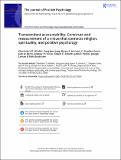Transcendent accountability : construct and measurement of a virtue that connects religion, spirituality, and positive psychology
Abstract
Welcoming accountability is a responsive and responsible virtue that can be shown in relation to people or to God, a higher power, or transcendent guide. Our interdisciplinary team defined transcendent accountability (TA) and developed a 10-item scale using classical and item response theory methods. Across diverse US samples (total N = 990) the scale exhibited internal consistency, construct validity, incremental validity, known-groups validity, and test-retest reliability. TA showed positive correlations with religious and spiritual variables, transcendent virtues (gratitude to God, eschatological hope), human virtues (gratitude, accountability, forgiveness), relationality (agreeableness, empathy), responsibility (conscientiousness, self-regulation), values-congruent autonomy, meaning, and flourishing. It had inverse correlations with negative attitudes and symptoms (personality disorder, anxiety, depression), and weak associations with searching for meaning and social desirability. TA predicted unique variance in spiritual flourishing, meaning, and relational repair. Transcendent accountability is a valuable construct that complements gratitude to God (GTG) and advances positive psychology.
Citation
Witvliet , C V O , Jang , S J , Johnson , B , Evans , C S , Berry , J W , Torrance , A B , Roberts , R C , Peteet , J , Leman , J & Bradshaw , M 2023 , ' Transcendent accountability : construct and measurement of a virtue that connects religion, spirituality, and positive psychology ' , The Journal of Positive Psychology , vol. Latest Articles . https://doi.org/10.1080/17439760.2023.2170824
Publication
The Journal of Positive Psychology
Status
Peer reviewed
Type
Journal article
Description
Funding: We are grateful to the Templeton Religion Trust (Grant TRT 0171) for generous support that made this research possible.Collections
Items in the St Andrews Research Repository are protected by copyright, with all rights reserved, unless otherwise indicated.

